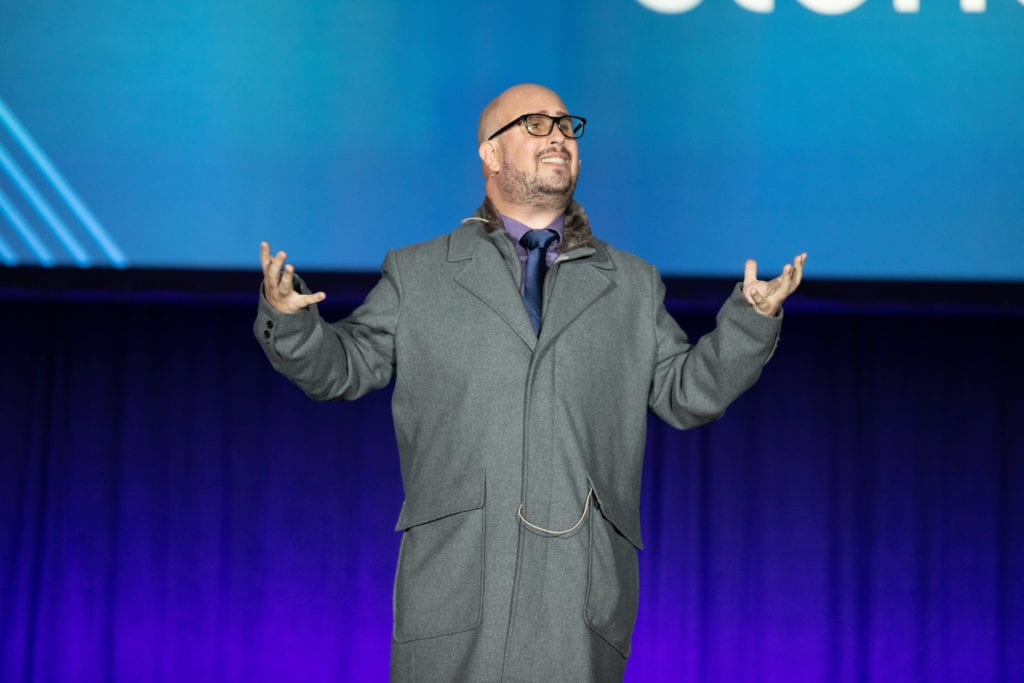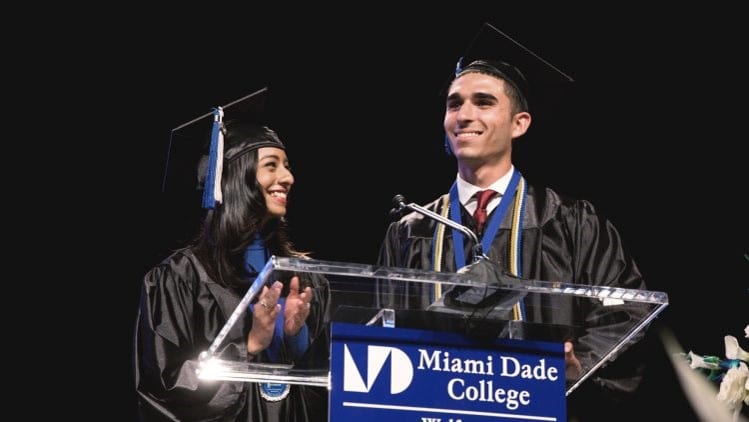— By Jaime Anzalotta, Ph.D.
Editor’s note: Jaime Anzalotta, the former Dean of Students and current Chief Enrollment Officer at Miami Dade College, delivered this talk at EAB’s 2019 CONNECTED conference. His speech has been lightly edited and adapted for the web by Kathleen Escarcha.

“Hello. My name is Enrique and I’m here because I want a better life. Can you help me?” That is what this student said to me within 10 seconds of meeting him. Talk about a captivating introduction.
The morning I met Enrique, I was heading out of my office to meet with my boss. I happened to stop at the front desk of the Educate Tomorrow office, which is Miami Dade College‘s office dedicated to serving students who are adopted, aging out of foster care, or experiencing homelessness. On that day, I decided to introduce myself to Enrique. Although I did not know details of his story, I was struck by his eagerness.
“Hello. My name is Enrique and I’m here because I want a better life. Can you help me?”
Enrique, Student at Miami Dade College
It was an instant connection. I called my boss and told her that I could no longer meet with her. In that moment, I just knew Enrique needed my support. We proceeded to spend the next two hours in my office getting to know each other and talking about what he needed in order to be successful.
I saw him looking around my office and could sense that he was a bit hesitant to share his story, so I assured him that he should not be fooled by my suit, my tie, or the degrees hanging on the wall. I wanted him to know that my story, like his, was not an easy one.
Sharing my story
I arrived at Miami Dade College as a shy, sheltered, and insecure 17-year old who had dropped out of high school. My family had fled from Puerto Rico when I was seven because of violence and financial instability.
When I started going to school in the States, I was bullied and didn’t have any friends. For some, school was a place to meet people and flourish. For me, it made me anxious, lonely, and insecure. Despite doing well academically, I dropped out when I was 15.
15
My mother, who was my protector and closest friend, convinced me to go to night school and earn my high school diploma. About six months later, as she, my brother and I were watching a telenovela—or Spanish soap opera—I heard an unforgettable and traumatizing scream. A scream that 23 years later, I still struggle to get out of my mind. There was my mother, on the floor, suffering from a massive heart attack, grasping for air, shaking like a fish out of water. My greatest possession died in my arms when I was 16 years old. She was 43.
Her death didn’t come with instructions for how to navigate the world. In that moment, I changed. I knew if I wanted to live the life that I wanted to live, I had to change.
I decided to do the best I could. I was going to night school from 3 pm to 10 pm every single day. After that, I would help my dad at his second job, cleaning supermarkets afterhours. I channeled my grief and fear into my studies and took just one step at a time. I went from being a high school drop-out with no anchor and no direction to earning my doctoral degree in conflict resolution. I knew if I could do that, Enrique could, too.
After sharing my story, Enrique began to open up and talk about his very tough upbringing, including neglect and most acutely, homelessness. He did not have a stable home at the time and was desperate for a place to live so that he could succeed in college.
Fortunately, we were able to get him placed at Camillus House, a local shelter with a youth program for students attending college. The program provided him with three meals per day, psychological assistance, and many other critical resources.
A challenging opportunity
“If we can learn to surrender our shame and embrace our own stories, then I have no doubt that we will inspire the next generation of students—not only to succeed—but to become inspiring, motivational storytellers themselves.”
Jaime Anzalotta, Dean of Students at Miami Dade College
Fast forward a few months, I received an email from my boss asking me to moderate a panel here in Washington, D.C., for the Department of Education. She also asked that I nominate a student to sit on the panel who would represent our college. Enrique was the first person who came to mind.
Unfortunately, when I approached Enrique about this opportunity, he told me, “Dean, I am not ready for this. Not only will I make a fool of myself, but I’ll also make a fool of you!” I told him, “It’s OK if you decide not to do this, but it won’t be because you feel like you can’t. What if we work through it together?”
He was initially reluctant. How many people have made that promise and have let Enrique down? In my suit and tie and big office, I was that principal, case worker, family member, cop who had not been there for him. I was all those people that had made promises to him and didn’t follow through.
I knew I had to build trust with him. When our first meeting rolled around, he said to me, “I cannot believe you actually came through—that you’re actually here helping me do this.”
A turning point

I am happy to report that Enrique did a phenomenal job on that panel. That experience became a game changer for him. It boosted his confidence tremendously and it gave him the encouragement he needed to surrender his shame and fully embrace his story. His story was now one of pride.
Enrique went on to become the vice president of the Student Government Association, travel to Indonesia on a study abroad scholarship, be selected as an American Dream Scholar by Achieving the Dream, and graduate with 3.6 GPA. But most importantly, Enrique became a storyteller who uses his story to encourage and advocate for other students.
For many administrators, our role is to break down the systematic barriers that keep students like me, and even some of you, from being successful. That work is good, and that work must happen. But in addition to the tangible resources, what our students really need is someone they consider “in power” to tell them “you are worthy, you matter, and I believe in you.”
People always ask “Jaime, why do you get in front of people and say that you were a drop-out?” And I say, “That’s what makes me, me.” And if collectively, we can learn to surrender our shame and embrace our own stories, then I have no doubt that we will inspire the next generation of students—not only to succeed—but to become inspiring, motivational storytellers themselves.
Watch Dr. Anzalotta’s story below
More ways to support student success
What is the most important story you’ll tell your students?
What's the most important story you’ll tell your students to inspire them to preserve and remind them that they're not alone? It may just be yours.
Taking Action on Student Equity
Historically underserved and nontraditional students make up the majority of today’s community college population, yet their completion rates continue to lag behind those of traditional students. Improve student outcomes for at-risk populations with 21 strategies to promote equitable opportunities.
How to get first-generation student support right
We sat down with leaders from Florida State University to discuss how FSU provides comprehensive, holistic support for first-generation students. Learn how they built unique programs that give first-gen students not only academic support, but a sense of pride and belonging on campus.
What student success leaders got wrong, and what they discovered instead
Back when I was in college, I naively believed that students usually became “stop-outs”—withdrawing enrollment from school temporarily—because they couldn’t keep up with the academic work. It took seeing the impact that mental health and family crises could have on my peers, and then my own life, to change my thinking. After seeing those who […]


